Interview with Cynthia Jones
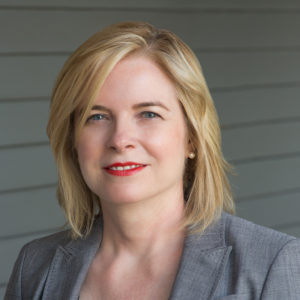
Cynthia Jones
I met Cynthia Jones in my very first writing workshop at Antioch. I remember being impressed with both her moving family memoir essay and her thorough and thoughtful feedback. We did not meet again until after we both graduated, two years later, in a workshop with our wonderful mentor Ana Maria Spagna. Cynthia and I are now in a writing group together that meets every other Thursday, so I get to Zoom with her often. YAY!
Cynthia is a fascinating woman who works by day as an attorney and still has found the time to write a book—it’s almost done—that’s part history and part memoir about her hometown Hanford, Washington–the site of the Hanford Nuclear Reservation where the Trinity bomb and the bomb dropped on Nagasaki were manufactured–and what it was like to live there. I’ve read several chapters in progress and the work is incredibly moving– and important.
Cynthia also just added an adorable puppy to the mix (whom you’ll see, along with his four-legged brother in several of the pics below)!
Diane: I’m very excited that you agreed to do this, Cynthia.
Cynthia: Thank you.
Diane:. I wanted to talk to you today about a bunch of things. Let’s start with your day job.
Cynthia: I’m an attorney in Seattle. I own my own firm and have for the last 11 years. I started primarily doing appellate work in the Ninth Circuit Court of Appeals at Washington State Supreme Court and then the three courts of appeal in Washington State.
Right out of law school, I clerked at our state Supreme Court for Justice Charles Johnson. That is where I fell in love with appeals, which became my primary focus. In the last dozen years or so, I have been asked to do trial work again and have resisted the urge. But I have given in and am diving into the trial arena again.
For an Appellate Attorney Like Myself, It Is the Holy Grail
Diane: Do you do criminal appeals?
Cynthia: I do. When a defendant stands trial, whether a civil or criminal litigant, and they lose a trial or even win at trial, one party can appeal to the next level of court. That’s the bulk of where my practice occurs- in those courts of appeal.
I have had cases that I’ve petitioned to the U.S. Supreme Court. I’ve not had any cases accepted there.
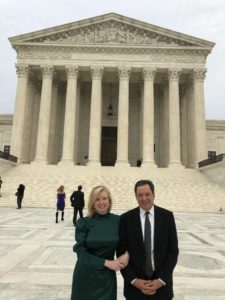
Cynthia & Paul at the the Supreme Court
Diane: Wow. Is it the dream to get to the Supreme Court?
Cynthia: Oh, it absolutely is. I remember my first petition for review, and while I knew it was a slim shot, it was still very exciting. For an appellate attorney like myself, it is the holy grail. I will say, I’ve had many cases that I have taken up and argued at the Washington State Supreme Court, which was also quite satisfying.
Diane: What is criminal law like?
Cynthia: Well, it’s intense. If you’re at the appellate level, there is an arm’s length transactional sort of feeling about it in the beginning because the client has already been through the trial process. When they’re coming to me, if the client is a criminal defendant who’s been convicted of a crime, they’re most likely incarcerated. If it’s a civil client, they’ve either lost the case and want to seek redress in the appellate court or they’ve won the case and want to defend the decision in the appellate court.
Their Liberty Is at Stake and the Outcome Is in Your Hands
But on a criminal side, when you’re at the trial level, this person coming to you in probably the most traumatic point in their life. They are experiencing severe trauma based on the fact that—in many cases—they’ve made a huge error of judgment. In a lot of situations, a single act or behavior has completely upended a client’s life and now they find themselves in the criminal justice system. You’re walking them through that, you’re living it with them. And the intensity comes because of the pressure that their liberty is at stake and the outcome is in your hands.
The task at hand is first principles. You do everything you can with the law, the facts, making sure you’re going through the discovery, turning over every rock … the smallest details can matter as much as the larger ones.
As a criminal defense lawyer, I would still be the first person to say, there are circumstances wherein people need to be incarcerated. There are reasons we have laws to protect society. But many times, people get tripped up in the complex web of the criminal justice system. And maybe they’ve committed a crime, but maybe the government is overreaching and overcharging. And in that process, constitutional violations have occurred. I find that most lawyers, no matter what side of the case they fall on, are well intentioned, and just doing the very best they can under the circumstances.
Before law school, I worked as a political journalist for a newspaper. Sometimes reporters get it wrong, sometimes judges get it wrong. If a trial judge makes a decision that needs to be reviewed, we have appellate courts.
“I’ve Had Two Situations Where I Have Allowed Myself to Tear Up in Court”
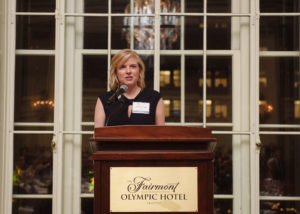 Diane: You don’t meet the clients in appellate?
Diane: You don’t meet the clients in appellate?
Cynthia: You do meet the clients, but it gets complicated, especially in the federal court system. Let’s say you get arrested, and you eventually get convicted of a crime in federal court. After the conviction, most people go into the custody of the Bureau of Prisons, a federal system that operates prisons in all 50 states. They can be sent anywhere in the country. My last client was convicted in Washington state. All of his family resides in Washington, but the Bureau of Prisons sent him to Florida after his conviction. So, the only way he and I could meet was by telephone.
Diane: What about being a woman in this field?
Cynthia: Oh, it can be difficult. I think there’s an element of being in the moment and at times I have found myself on the verge of tears when it gets too intense. However, if you ever find yourself in a position where you’re speaking publicly, or you’re otherwise in a situation that you feel you’re going to cry and don’t want to, someone once told me, you take a drink of water when and swallow. It is biologically impossible–or so I was told—for your tear ducts to produce tears while you’re swallowing.
Diane: Oh, that’s a wonderful tip.
Cynthia: I found that to be true. I’ve had two situations where I have allowed myself to tear up in court. One was recently in 2019.
“If I Didn’t Prove All Those Nine Elements, We’d Lose the Case”
When we got to the day of the sentencing, there was this moment where you could hear a pin drop in the courtroom. When the judge ruled in our favor, and when I heard his decision, I had tears gushing down. And it was okay. That was an okay time to cry.
The second time I’ve teared up was when I was a civil litigator.
The judge asks the jury foreman, “Have you reached a verdict?” And the foreman stands up and says, “Yes, we have.” And then, it’s like time stops. The bailiff takes the verdict form over to the judge. The judge opens it up and goes down one by one. On element number one, the jury found for the plaintiff and then went all the way to element nine. If I didn’t prove all those nine elements, we’d lose the case. And there’s the polling of the jury, where the judge asks each juror, “Is this your verdict? And is this the verdict of the jury?”
My client, through that whole polling, buried her head in her arms at counsel table and wailed out loud from the sheer relief of winning the case. I’m almost tearing up talking about it right now, but that day I let my tears flow.
Diane: As a woman attorney, you just had a deeper understanding of those nuances than had your clients been represented by men.
Cynthia: I hadn’t thought about that, but I think you’re right. I think there are things we intuitively just take for granted.
Diane: We just do. Call me whatever, but I truly believe it.
“I May Not Know Everything, But I Know Enough. And I Know When to Ask a Question or When to Seek Advice”
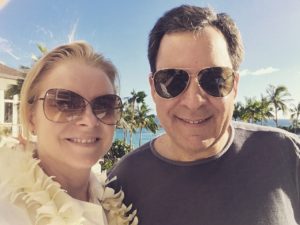
Cynthia & Paul Hawaii
Cynthia: When I first started practicing an opposing attorney told me “Counsel, you don’t know what the hell you’re doing,” right in the middle of my taking a deposition! I am convinced he would not have said that had I been a man.
Diane: What if this guy or some other guy said the same thing to you today in a deposition? How would you handle it?
Cynthia: I think I would laugh out loud and say to the transcriptionist, “Let the record show the counsel’s response is laughter.” And then I’d move on. I’d like to think based on the feedback that I get from colleagues and opposing counsel that I’ve earned a level of respect, and with my reputation, I don’t think someone would say that to me today even though it did happen early on in my career.
I think there comes a time when you feel settled, but one thing you don’t ever want to do in the law is get completely comfortable. It’s more of the kind of confidence that, I may not know everything, but I know enough. And I know when to ask a question or when to seek advice. It can ground you so that when someone comes at you like that, it’s like, well, I have nothing to prove to this person. If you’ve only been practicing a couple of years, I think new lawyers, especially women, can get taken aback.
Diane: I could talk to you about this forever, but I want to switch gears. I want to talk about your fascinating book. Tell us about it.
“The Book Is about the Place I Grew Up, Hanford, Washington”
Cynthia: The book is about the place I grew up, Hanford, Washington, a bedroom town of the Hanford Nuclear Reservation, where both of my parents worked. It is a community of about now maybe over 100,000 people. Hanford started as a farming community in the early 1900s. And with the coming of World War II, the farmers and the indigenous people were evicted to make way for the world’s first plutonium plant that manufactured the trinity bomb and the bomb that was dropped in Nagasaki.
The book is in three parts. Up through part one, you will learn who the town’s named for, who lived there before it was a nuclear reservation and how it became the nuclear reservation leading up to the end of World War II.
Part two is about the war and the impact Hanford had on World War II. Both parts include the story of my own family.
Part three covers the cleanup stage after the Cold War ended. The plutonium plants in Hanford ceased to produce the plutonium. It turned into cleanup mode because of all the nuclear waste from producing plutonium.
That leads into the story of my mother’s work responding to nuclear and radiation accidents during her time in Hanford, but which she couldn’t talk about because it was classified. It became declassified by 2019 when I interviewed her about it.
“I Started Thinking about Why I Never Questioned What Happened at Hanford”
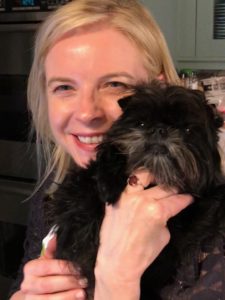
Cynthia & Poirot
My goals with the book are to impart some history about how Hanford became what the atomic nuclear museum in New Mexico says is the most contaminated place on earth, the contradictory nature of its impact on a war that we won, but also on people who produced the plutonium and the people who were victims of the bombs which were produced. My own family story adds a lot of contradiction because when I grew up there, it just wasn’t talked about. I didn’t really understand and didn’t really ever get curious about what my own parents did when I was a child.
It wasn’t until I moved away 200 miles to the west and lived in Seattle … Really, it was after I started my law career. I think a legal education teaches you how to ask really hard questions. In that process, I started thinking about why I never questioned what happened at Hanford and why I was born into and really acclimated to a social fabric that was all about conformity and not questioning authority. It permeated every social interaction I had, whether it was in my elementary school or at home at the dinner table. My father was a blue collar working Democrat that never questioned authority. And by osmosis, that’s how I operated in the world until I went to law school.
“I Felt Like There Were New Pathways in My Brain Being Formed”
I am the first person in my family to graduate from high school. My family had a work ethic. You left school to go get a job. And those were the days you could get a pretty good paying blue collar job and support your family without a high school education. I’m the one that first broke the mold of higher education. My mother eventually sought a master’s degree and did rise in her career through education later in life.
Diane: So you were a rule follower.
Cynthia: Totally.
Diane: Law school must have been like a crisis … sort of like everything you had believed might not be the way it was.
Cynthia: Yeah. I would say that it was. There were times when I felt like there were new pathways in my brain being formed. Moments of peeling back layers of what it is to question how things are decided and how policy is created. Who are the people behind the levers doing that? I take a lot of my legal research skills to go into the history, so there’s a lot there for history buffs. I weave in my own family stories, but it’s not quite memoir. It’s this hybrid of different literary tools to get at what is not a straightforward story.
It took me a couple of years to write the prologue where I share what I was struggling with. I am appalled at what Hanford stands for, what happened there, and what it has done to the environment. And I love the place because all my formative years are there. My father died there. My coming of age stories happened there. Slowly, you start to see things that you should question, but you don’t because that’s not what you do.
“I’ve Become a Lot More Comfortable with What It Is to Be a Walking Contradiction”
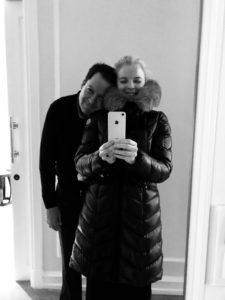 Diane: So it’s living in secrecy, but it’s a collusion of secrecy.
Diane: So it’s living in secrecy, but it’s a collusion of secrecy.
Cynthia: Exactly. That’s what it is.
Diane: That can also make you feel kind of crazy in some ways, doubt your own perceptions.
Cynthia: Yeah. I think people either stay there the rest of their lives and double down on the conformity or they leave. If there are some in between, I think those people that were born and raised there moved away and then came back with a different perspective.
Diane: How has your life changed from the writing of this?
Cynthia: I’ve become a lot more comfortable with what it is to be a walking contradiction and with how life isn’t black and white. There are so many grey areas and sitting with that has become a lot more comfortable than it used to be. I have so much more compassion for my mother and a lot more understanding, seeing my parents as people versus parents. That’s been a really interesting journey.
Diane: Wow. Isn’t it something how this kind of work can really create a huge shift?
Cynthia: You get the deeper surprises. I traveled to as many places as I could. This was all pre-pandemic. To the places that Hanford impacted. One of those places was Nagasaki.
“The Big Takeaway Was Feeling Humility”
My husband had never been to Japan. I’ve been once with my mother in 2000 to Hiroshima. In 2018, my husband and I went to Nagasaki, Tokyo, and Kyoto. We made a vacation out of it, but it was prompted by this needed research. I felt for the book to have integrity, that was the most impactful thing I had do aside from documenting the environmental disaster it’s become.
Diane: What was the trip like?
Cynthia: I think the big takeaway was feeling humility. It was a very internal private emotion being there. But also the contrast with which Japan has dealt with the nuclear age and trying to prevent that from happening again, versus the United States dealing with the nuclear as something to be proud of. We’re learning. I’m not sure I could have really understood that thoroughly without having physically gone and witnessed it firsthand.
Diane: It’s very powerful.
Cynthia: Yeah. So, I hope I find some readers for it. I hope it gets out in the world.
Diane: Well, you have me.
Cynthia: You know how it is as a fellow writer. When it’s our own work, it just feels like it’s never going to get anywhere. It’s going to linger in the drawer or in the laptop.
Diane: But you’re pretty far along on this journey. It’s very exciting.
Cynthia: It’s almost finished—in the editing stage.
It’s taking a lot of years.
Going on five years, even longer.
“I Just Wanted to Know What It Is to Write a Book”
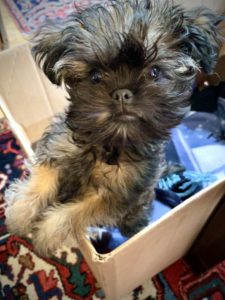
Valentino
Diane: Is that why you went for your MFA?
Cynthia: It is. I wanted to know what it was to write a book. What goes into it. It just took me time to finish it, but I did.
Diane: This has been so wonderful, Cynthia. Any final words?
Cynthia: I think the final words are, I just have really appreciated and admired you. Even from that first workshop when I met you in Antioch for not just your genuineness, but that you are full on and in the lane of being a writer, in it all the time. I feel a lot of the time like I’m straddling two worlds and would just love to be in the writing world, more in that lane. I’m just honored that you wanted to talk with me.
Diane: Well, thank you for that. And I’m so honored that you agreed. I feel like this writing stuff … everyone says it’s like a solitary thing. I mean, the writing itself is, but I’ve made such wonderful deep connections that I don’t feel alone in it.
Cynthia: Yeah. I think it helps to have community. Our writing group is such a helpful community to have.
Diane: It’s wonderful.
Cynthia: Thank for this.
Diane: Thank you, Cynthia! It’s been fascinating. And fun.
As always, I’d love to hear from you. Please leave a comment or send me an email.
See you June 21st!
XOXO
Diane



Diane! Cynthia! Such a wonderful interview! I loved learning about you through the lens of your day job, Cynthia. Your perspective about what we bring as women and also what we face at times. I SO loved your note for the record in response to inappropriate comments from Counsel!
As always, great interviewing, Diane. Thank you for centering women in this way.
And thanks to you, Cynthia, for the years of research and hard work on your important book about Hanford. I look forward to reading it in full.
You are both amazing women doing great things. XO ~Kathie
Thank you, Kathie!! So much fun to learn another side to Cynthia! What a powerful, compassionate woman!
XO
Thank you Kathie!
Great conversation and interview (as always!).
Cynthia’s book sounds fascinating. Can’t wait to read!
Thanks, Jessica! And I can’t wait to read Cynthia’s book either!!
Wonderful interview, Diane. I admire you and Cynthia both so much!
Thank you, Ana Maria! Cynthia made it easy!
Love this, Diane! Especially love the way Cynthia describes her transformation with crying. There’s a balance for women and the answers are personal. Cynthia is brilliant and it was a pleasure reading about her relationship with education in a family that didn’t prioritize it. I’ll read this, again.
So much here gave me “pause” as you intended!
Thanks so much, Jeanne! I loved speaking with Cynthia and learning so much about her–lots to pause and think about!!